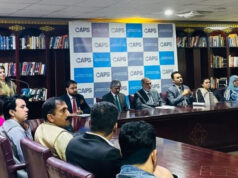Adnan Aamir
Over the years, the province of Balochistan has been marred by bad governance, financial corruption and lack of intent on part of the rulers to resolve problems. This has created a dysfunctional system in the region, where the bureaucrats are either directly involved in corruption or not interested in resolving the problems of the masses, even if they are not financially corrupt. However, in the 49-year history of Balochistan since becoming a province, one unique and exemplary bureaucrat stands out: Ahmed Baksh Lehri.
Lehri was born in 1954 in Narmuk, a village located 165 kilometers south-east of Quetta, in a financially under-privileged family. In order to finance his secondary education, he set up a small shop in the town of Mach. After moving to Quetta in the early 1970s, he worked in a battery workshop before getting a clerical job. He appeared for the Central Superior Services (CSS) exams in 1978 and started his illustrious career in 1980. Lehri retired in 2014 after serving as chief secretary of Balochistan and federal secretary of five departments, among other postings. Perhaps only a handful of bureaucrats in Pakistan can be said to have achieved similar success.
Read Also: Constitutional Role of Balochistan Needs to be Acknowledged with Respect to Gwadar: Ahmed Baksh
This year, Lehri published his autobiography, On the Mud Track. The title is inspired by the humble beginnings of the author and also the under-development in Balochistan. The contents of the book, therefore, are focused as much on Lehri as on the governance issues afflicting the province.
In the mid-1980s, Lehri held the charge of director-general of the Quetta Development Authority (QDA). He writes in his book that he had drafted a bill to restrict the construction of buildings in Quetta because of growing congestion and scarcity of water. However, he was later transferred and the bill was scrapped. If that bill had been allowed to pass by the assembly back then, today Quetta would perhaps not be facing the problems of extreme congestion and chronic water shortage.
Lehri criticizes the spending of development funds by elected members of the assembly and notes that, in the 1980s, he was part of a committee to probe the misappropriation of funds allocated to MPAs. For the probe, he traveled 30,000 km and prepared an 800-page report in nine months. Today, this report can be considered a charge sheet against the ongoing corrupt practices of MPA-driven development spending.
But corruption does not limit itself to government officials. Lehri also reveals that, when he was serving as assistant commissioner in the border town of Chaman, his friends would visit Chaman to shop for cheap, smuggled goods and expected him to allow unchecked transportation of the same to Quetta. He discloses that, as a consequence of his refusal to entertain such requests, he managed to lose many of his ‘friends’.
There is criticism in his book about the bureaucratic system, where common people face hurdles at government offices for even the most minor of issues. In order to tackle this problem, he initiated an open-door policy where, throughout his career, his door was always open to the public and no one was required to wait or schedule an appointment in advance. He continued this policy even after becoming the chief secretary of Balochistan — a position that comes with an enormous workload and innumerable responsibilities. The open-door policy not only made Lehri popular but also set a precedent that has now been adopted by a handful of government officers.
A chapter in the book deals with Gwadar, the cornerstone of the China-Pakistan Economic Corridor (CPEC) project. Lehri served in Gwadar from 2003 to 2008, where he established the Gwadar Development Authority (GDA). He fondly remembers the ‘good times’ of Gwadar when three air flights operated to the town per day and Western diplomats used to visit it by road. Today, the frequency has reduced to a few flights per week, which are often canceled, and no foreigner can visit Gwadar without getting permission from the Home department of Balochistan. This explains why, rather than developing, things have changed for the worse in the last 15 years for the port town of Gwadar.
The author also touches on the deprivation prevailing in Balochistan and how the government machinery has failed to address this. For example, he reveals that, in 1980, there was a proposal to relocate the prestigious Civil Services Academy from Lahore to Quetta. However, the then director-general of the academy made sure this did not happen. Had the academy been shifted to Quetta, it would have benefitted the city greatly over the last 39 years. Furthermore, when Lehri was appointed as secretary establishment during the caretaker government of Mir Hazar Khan Khoso, then prime minister Khoso suggested that the top positions in Islamabad — such as inspector general, commissioner, deputy commissioner and superintendent of police among others — should be rotated between all provinces because Islamabad was a federal territory. However, once the Pakistan Muslim League (Nawaz) came to power, the proposal was dropped because it went contrary to their vested interests as they wanted bureaucrats from Punjab in all coveted positions of the Islamabad administration.
Lehri writes his book in an engaging, descriptive style and loads the pages with interesting anecdotes. For example, he writes that, in 1982, the Nokkundi town in the Chagai district was supplied with water via trains. The social status of a person in Nokkundi was determined by how many cans of water he could acquire from the water-transporting trains. The author also makes mention of the ordeal of two Sikh couples who were traveling in cars from Germany to India, when they were arrested in the town of Taftan on the Balochistan-Iran border because their visas had expired. At the time, Lehri was the assistant commissioner of Taftan and had to detain the Sikh travelers for six months in an abandoned Hindu temple in Dalbandin because of the delay in processing their paperwork in Islamabad, which was required for their deportation to India. These are just a few examples of how common people suffer in peripheral districts because of the dysfunctional government system.
In 1999, Lehri was working as Secretary Forest and Wildlife when Amirul Mulk Mengal was appointed by Gen Pervez Musharraf as governor of Balochistan. The chief secretary was on medical leave at the time and, surprisingly, Lehri was asked to moderate the oath-taking ceremony. Later, when asked by journalists why the Secretary Forests and Wildlife, of all people, was deputed to moderate the swearing-in ceremony for a governor, he spontaneously responded that since Pakistan was under martial law — which was very much like the law of the jungle — it was only appropriate that the person in charge of forests and wildlife should moderate. The journalists, knowing the sensitivity of the statement, decided to self-censor and thus Lehri was shielded from the wrath of the Musharraf regime.
On the Mud Track is an informative book worth reading but, as is the case with many publications coming out of Balochistan, the content-rich book is not very well organized. There are over a dozen chapters, but they are not linked with one another. Dates are often left out, which makes it difficult to determine when an event mentioned happened. If the dates of important events are added in future editions, this book has the potential to become a very useful reference for researchers studying governance in Balochistan.
After retiring from government service in 2014, Lehri served as a member of the Federal Public Service Commission till 2017. Since then he has been living a quiet life of retirement in Quetta. Unlike other top bureaucrats, he chose not to amass wealth and assets and, if the future bureaucrats of Balochistan would follow in his footsteps of honesty, discipline and public-friendly behavior, then many of Balochistan’s problems can be resolved.
On the Mud Track
By Ahmed Baksh Lehri
New College Publications, Lahore
ISBN: 978-9697591053
196pp.
Originally published in Dawn newspaper
Share your comments!








